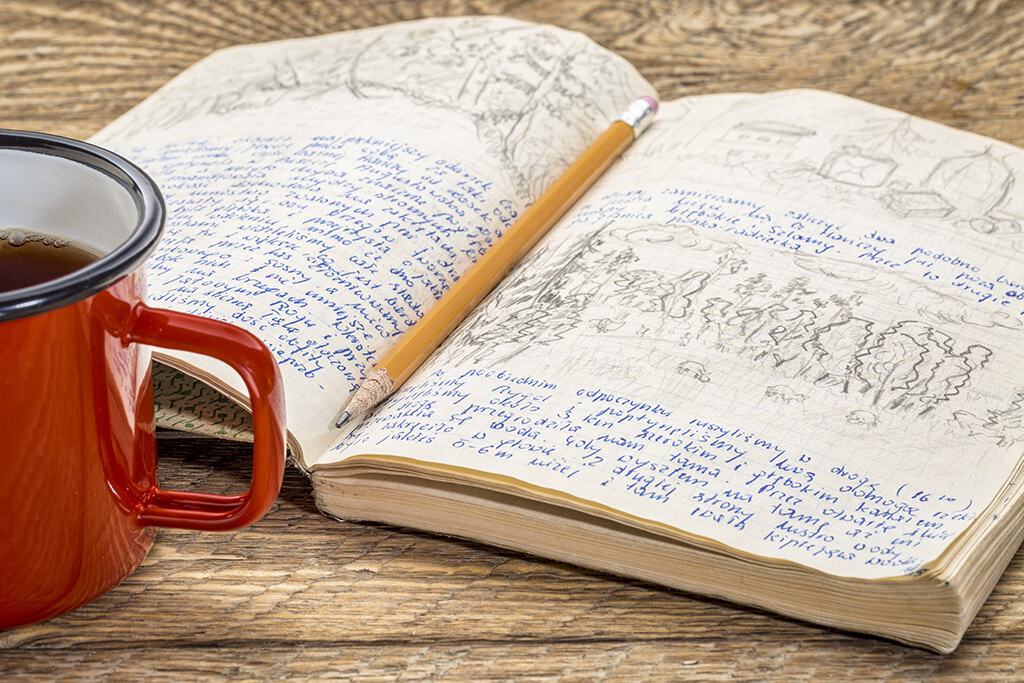
The most important text for both of our courses is empty: your journal. The description prompts below adapted from Mark Doty’s “Description Alphabet” in his book The Art of Description (2010). The “check in” prompts are from Lavinia Spalding’s Writing Away (2018). Use these prompts to find new ways of seeing and new ways of expressing what you see.
BEAUTY: Write a beautiful thing you’ve witnessed or experienced “ugly.” Or, write the ugly thing you’ve witnessed or experienced “beautiful.”
COLOR: Dwell in color during one of your outings. Make a list of “named colors” based on several things that caught your eye. Make your reader see and feel those colors.
CONTOUR DRAWING: Draw the scene, artwork, place, landscape, vista, person that you are gazing at. Then, describe the act or process of drawing.
DESIRE: Write about a moment when you experienced feelings of heightened emotion, awe, pleasure, or sensation while traveling? Desire, here, encompasses any overwhelming upsurge of longing, love, beauty, and connection.
ECONOMY & EXCESS: Respond to something in a bare-bones, minimal language—that is, no adjectives, no proper nouns, no adverbs—but still try to get across the resonance of it. Then, respond to the same thing with maximal effect, using lush, gorged language.
FIGURES: Metaphor helps us understand the world: it both complicates our understanding of something and clarifies it by revealing a new possible meanings and relations. When best employed, metaphor ties together two dissimilar things, showing them to share some qualities or connections. Generate a healthy list of different metaphors based on things you see.
HUNGER: Savor words! Feast on language! Write down uncommon (silly or serious) words, phrases, or translations you happen upon, whether you spot it on a menu or on a wine bottle; read it on an artwork’s description or in a museum’s pamphlet; see it on an advertisement on a bus; or, overhear it. Language can be English, Italian, etc.
JUXTAPOSITION: Generate a list of things, sightings, objects, feelings that sit side-by-side, but do not quite go together, that clash in some way. Find a way to “yoke,” as Doty suggests, “disparate elements,” then, consider whether those things together mean anything more, beyond their surface appearances.
KNOWING: To come to “know” something is to first approach it with new eyes, as if seeing it for the first time. Strive to capture those moments of de-familiarization—moments when you might feel outside of yourself or not yourself (which happens frequently when one travels). What sparked this feeling? How does the body feel or react? What sensory details can be applied to those feeling? Write from the second-person perspective: “you.”
LANGUAGE: Put an artwork to words. Do this as a quick free write where you do not over-think or edit what you are writing. You can do this in a few ways: objective description, dramatic projection (thinking within the drama of the piece, or from the perspective / voice of something within the art); or personal reflection.
MORALITY: Find an artwork that depicts violence or something unsettling. Attempt to “fall short” of the subject you are contemplating; that is, try to remove direct or explicit moral judgments from your description.
NAMES: Collect (proper and specific) names of things: plants, creatures, types of buildings and architectural features, artworks, commodities, places, roads, furnishings, clothing/fabrics, etc.
PROJECTION: “Every portrait that is painted with feeling is a portrait of the artist, not of the sitter” (Oscar Wilde). Reflect on a scene or object and project your mood—your interiority or state of mind—onto the observed thing. That is, describe a scene, but do so in language that reflects your emotional state of mind at the time.
SYNESTHESIA: Go somewhere new. Quickly, without thinking much, jot down your sense perceptions (quality of light, sound, scent, touch) as they happen. Additionally, jot down events happening around you. Later, after you have a good long list, meld together the senses and events.
Check-in Prompts
SACRIFICE: Sacrifice and compromise come with travel. What have you let go of on this trip? What have you held on to? What do you still need to let go of ?
CHALLENGE :What is physically challenging about this trip? Mentally challenging? Spiritually? Emotionally?
WRITING AWAY: Write about loneliness, homesickness, or boredom
HOME AND AWAY: How plugged in are you to people back home? Are you spending too much or not enough time thinking and communicating with them?
THINKING FORWARD, THINKING BACK: When you look back on this journey three weeks from now, what will you remember? Three months from now? Three years? Thirty?
NOT HOME: Write about what it’s like for you not to be home.
